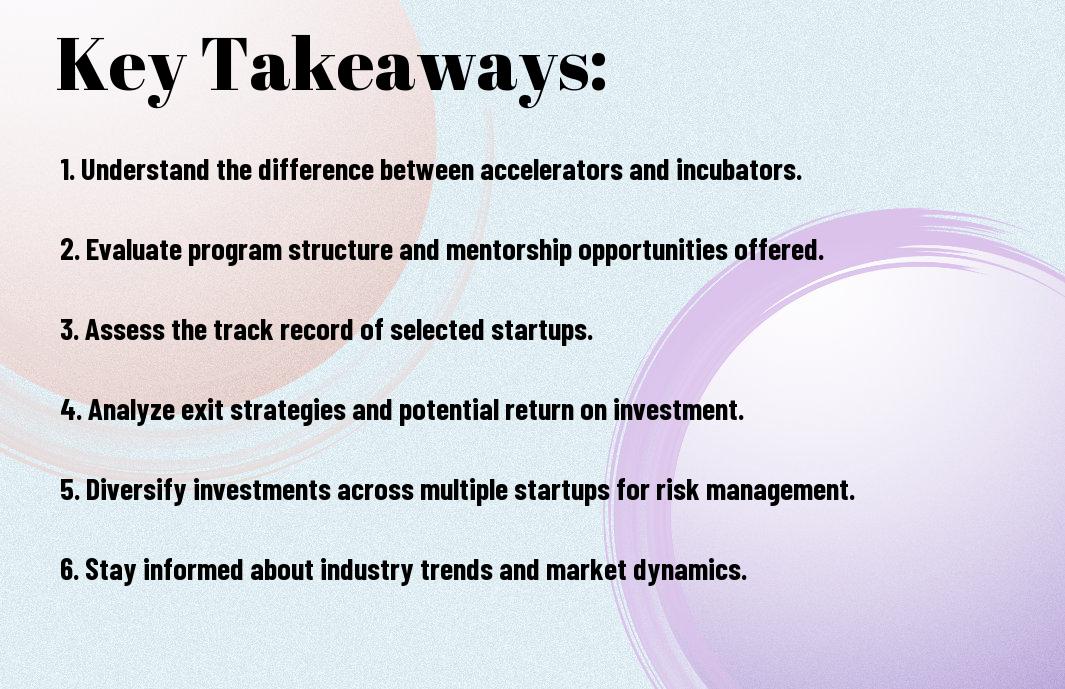You may be wondering how to effectively invest in startup accelerators and incubators, which serve as vital support systems for emerging businesses. Understanding the differences between these two entities can help you make informed decisions about where to put your money. An excellent resource for this is our guide on Startup Incubators vs Startup Accelerators. In this post, you will discover the fundamentals of investing in these innovative platforms and how they can shape your investment strategy.
Key Takeaways:
- Understanding Models: Differentiate between startup accelerators and incubators to identify which aligns with your investment strategy.
- Due Diligence: Conduct thorough research on the startups in the program to evaluate their potential for growth and success.
- Network Opportunities: Utilize the access to a network of mentors, investors, and industry experts that these programs often provide.

Understanding Startup Accelerators
The landscape of startup accelerators plays a significant role in nurturing early-stage businesses. These programs provide a structured framework to help startups grow, offering mentorship, resources, and funding in exchange for equity. By providing a supportive environment, accelerators aim to fast-track the development of innovative ideas, equipping founders with the skills and networks necessary for their success.
Definition and Purpose
By definition, startup accelerators are fixed-term programs that support early-stage startups through mentorship and resources. Their primary purpose is to guide entrepreneurs in refining their business models, developing products, and preparing for investment rounds, ultimately facilitating sustainable growth and increased chances of success.
Types of Startup Accelerators
With various forms of accelerator programs available to startups, it’s important to understand these different types to find the best fit for your business. Here are some common types:
| Type | Description |
|---|---|
| Seed Accelerators | Focus on very early-stage startups and often provide funding and mentorship. |
| Corporate Accelerators | Run by established companies to foster innovation and collaboration. |
| Social Impact Accelerators | Support startups addressing social or environmental challenges. |
| Industry-Specific Accelerators | Target specific sectors like technology, healthcare, or finance. |
| Virtual Accelerators | Offer their programs online, expanding accessibility for entrepreneurs. |
- Knowing your options can help you align your startup with an accelerator that matches your vision.
In fact, understanding the variations within startup accelerators can greatly enhance your chances of finding the right program. Below are further insights into each type:
| Type | Focus |
|---|---|
| Seed Accelerators | Help startups transition from idea to launch with seed funding. |
| Corporate Accelerators | Foster brand-new solutions that align with corporate objectives. |
| Social Impact Accelerators | Enhance startups dedicated to creating positive change. |
| Industry-Specific Accelerators | Provide specialized guidance based on industry requirements. |
| Virtual Accelerators | Leverage digital platforms for mentorship across geographic barriers. |
- Knowing the landscape of accelerators allows you to make informed decisions for your startup’s future.
The Role of Incubators
Any aspiring entrepreneur or investor should understand the significant contribution of incubators in the startup ecosystem. These organizations provide vital resources, mentorship, and support to early-stage companies, facilitating their growth and development. By nurturing innovative ideas, incubators create a supportive environment that can lead to successful business ventures.
Definition and Purpose
Role of incubators extends beyond just providing space for startups. They serve as a catalyst for innovation, helping entrepreneurs refine their business models, access funding opportunities, and establish crucial networks. This nurturing framework enables new ventures to enhance their chances of success in competitive markets.
Types of Incubators
One way to categorize incubators is by their focus and operational style. Understanding these types will aid you in determining which aligns best with your needs:
| Type of Incubator | Description |
|---|---|
| Academic Incubators | Linked to universities, providing access to research and skills. |
| Corporate Incubators | Sponsored by large companies aiming to innovate or invest. |
| Non-profit Incubators | Focus on community development and social entrepreneurship. |
| Private Incubators | For-profit entities seeking financial returns on their investments. |
| Virtual Incubators | Offer online resources and support rather than physical space. |
In fact, understanding the differences between these incubator types can lead you to make informed decisions about where to seek assistance. Here’s a breakdown of important characteristics:
- Academic Incubators focus on leveraging research expertise.
- Corporate Incubators foster synergy between startups and industry giants.
- Non-profit Incubators prioritize social impact and community service.
- Private Incubators aim for high growth and financial returns.
- Virtual Incubators provide flexible, remote access to resources.
After evaluating these options, you can strategically position yourself to maximize the benefits that best suit your entrepreneurial journey.
Differences Between Accelerators and Incubators
Now, understanding the differences between accelerators and incubators is necessary for your investment strategy. Accelerators typically focus on rapid growth, offering a structured program where startups receive mentorship, resources, and sometimes funding in exchange for equity. In contrast, incubators provide a more flexible environment, nurturing ideas without a fixed timeline. For more information about what is a startup accelerator or incubator?, research into their unique characteristics.
Program Length and Structure
Structure varies between accelerators and incubators, with accelerators often running intensive, time-bound programs lasting a few months, while incubators may extend for years as they foster long-term development and scalability of ideas.
Funding and Equity Considerations
One major difference lies in funding and equity. Accelerators typically require startups to give up a percentage of equity in exchange for seed capital and resources, while incubators may provide support without taking equity, allowing you to retain more ownership of your idea.
Another aspect to consider is how funding structures influence your startup’s potential growth. Accelerators often prepare you for investment rounds by connecting you with investors and refining your pitch, whereas incubators focus more on idea validation and business model development without immediate pressure for financing.

Evaluating Investment Opportunities
To evaluate investment opportunities in startup accelerators and incubators, you should focus on understanding the unique aspects of each program. Consider the accelerator’s track record of success, the quality of mentorship provided, and the startup’s potential market fit. Assess how aligned the accelerator’s vision is with your investment goals, as this will greatly influence your overall satisfaction with the opportunity.
Key Metrics to Consider
Before plunging into any investment, analyze key performance indicators such as portfolio company growth, funding amounts raised, and exit strategies employed by the accelerator. These metrics can provide valuable insights into the effectiveness of the program and its ability to generate returns on investment.
Due Diligence Process
Across your evaluation, establishing a comprehensive due diligence process is crucial. This involves investigating the accelerator’s history, its operational structure, and the specific startups it has nurtured. Pay close attention to financial statements, tracking previous investment outcomes, and assessing overall market trends to make informed decisions about your investments.
Even though due diligence may seem daunting, thoroughly investigating the accelerator’s partnerships, success stories, and team expertise will significantly bolster your confidence in the investment. You should also engage with program alumni and current startups to gain firsthand insights into their experiences. By conducting meticulous due diligence, you position yourself to make well-informed investment choices that align with your goals and risk tolerance.
Risks Involved in Investing
Despite the potential for high returns, investing in startup accelerators and incubators carries significant risks. You must understand that many startups fail, leading to a total loss of your investment. Furthermore, the volatility in markets and the uncertain outcomes of these early-stage companies can create a challenging environment for investors. Being aware of these risks is key to making informed decisions.
Market Risks
After launching your investment, the market conditions may fluctuate unpredictably. Economic downturns or shifts in consumer behavior can adversely impact the startups within the accelerator or incubator, affecting their performance and your returns. Staying updated on market trends is necessary for managing these risks effectively.
Operational Risks
Before you invest, it’s important to consider the operational risks associated with startups. These can include management issues, inadequate resources, and failure to execute business plans effectively. Understanding the operational dynamics of a startup can greatly influence its likelihood of success.
Operational risks encompass a range of challenges that startups face, including resource misallocation, internal conflicts, and execution failures. You should analyze the startup’s management team and operational strategy to gauge its potential for success. A lack of adequate planning or oversight can lead to setbacks that significantly impact your investment. Engaging with the startup’s founders and understanding their approach to operational management is vital in assessing the risk involved.
Case Studies of Successful Investments
After analyzing various investments in startup accelerators and incubators, you can see compelling examples of success showcasing significant returns. Here are some notable case studies:
- Y Combinator: Invested in Airbnb (2009), which is now valued at over $100 billion.
- Techstars: Mentored SendGrid (2009), acquired by Twilio for $3 billion in 2019.
- 500 Startups: Supported Credit Karma (2009), acquired by Intuit for $7.1 billion in 2020.
- Seedcamp: Backed TransferWise (2011), now valued at around $5 billion.
Notable Accelerator Success Stories
Besides the financial numbers, notable accelerator success stories highlight the transformative potential for young businesses. Companies like Dropbox, which was part of Y Combinator, harnessed the mentorship and resources to grow rapidly, achieving a valuation exceeding $10 billion. These examples illustrate how accelerators can be catalysts for unprecedented growth, propelling startups into multifaceted markets.
Impact of Incubators on Business Growth
To assess the impact of incubators on business growth, consider the vast resources they offer, ranging from mentorship to networking. Startups benefit from tailored guidance and access to industry experts, which fosters unparalleled development.
Plus, incubators also provide necessary funding opportunities that are vital during the early stages of a startup. By leveraging the collective experience and resources of seasoned entrepreneurs, these environments cultivate innovative ideas and strategic partnerships. Consequently, startups can navigate market challenges more effectively, leading to enhanced scalability and long-term sustainability in their sectors.
Conclusion
On the whole, investing in startup accelerators and incubators presents a unique opportunity for you to diversify your portfolio and support innovation. By understanding their structure, evaluating potential returns, and actively participating in the ecosystem, you can position yourself to benefit from emerging ventures. As you engage with these programs, keep an eye on trends, network with industry professionals, and continuously educate yourself. With diligence and strategic thinking, you can make informed decisions that align with your investment goals.
Q: What are startup accelerators and incubators?
A: Startup accelerators and incubators are programs designed to support early-stage companies, but they serve slightly different purposes. Accelerators provide a structured, time-limited program (often lasting 3 to 6 months) that includes mentorship, resources, and sometimes capital to help startups quickly develop their business models and products. In contrast, incubators typically offer a more open-ended environment, focusing on fostering innovation and development without a set timeline. They may provide office space, funding, and networking opportunities but often with a less intensive program structure.
Q: How can investors benefit from participating in startup accelerators or incubators?
A: Investors can gain numerous advantages by participating in startup accelerators or incubators. Firstly, these programs provide access to a diverse portfolio of startups, allowing for potential investment opportunities at early stages. Moreover, investors can engage with emerging entrepreneurs, helping them refine their business models, which increases the likelihood of successful outcomes. Additionally, by establishing relationships with other investors and industry mentors within the accelerator or incubator, they can further expand their networks and insights into market trends.
Q: What should investors consider before investing in a startup accelerator or incubator?
A: Before investing, it is crucial for investors to evaluate several factors including the accelerator’s or incubator’s track record, management team, and support network. Understanding their investment model, including equity stakes, revenue share, and mentorship programs, is also important. Furthermore, investors should assess the quality and stage of the startups within the program, as well as the industry focus if applicable. This comprehensive evaluation helps to ensure that the investment aligns with their financial goals and risk appetite.



